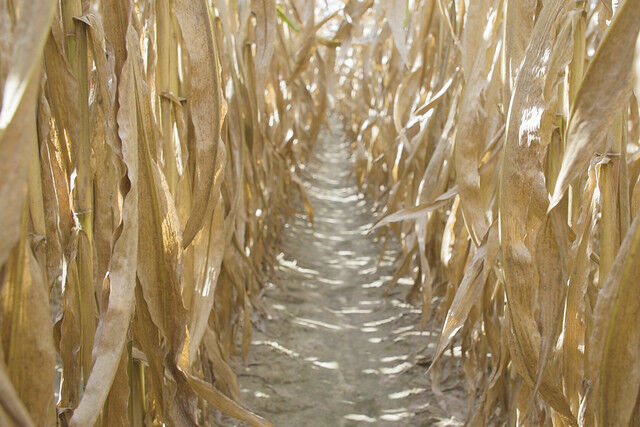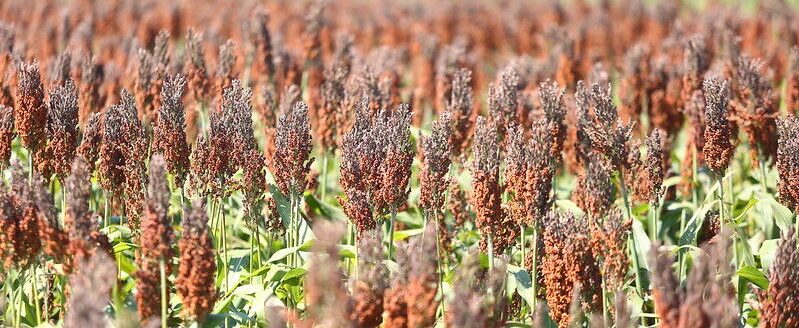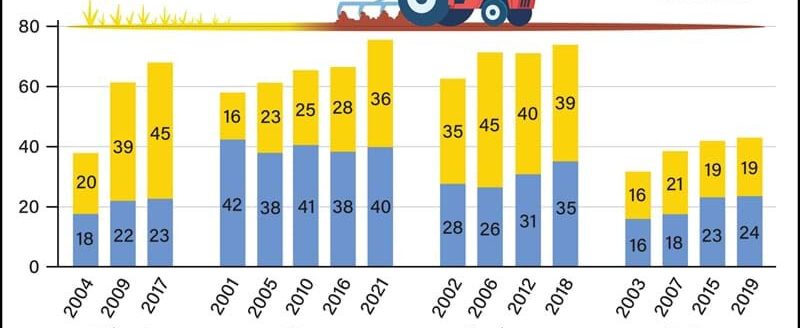Corn and cotton are the topics for the next virtual field day presented by the University of Arkansas System Division of Agriculture.
Beginning at 6 p.m. on Oct. 28, researchers and extension specialists will offer results on the latest corn and cotton studies, including weed control, fertilizer use and soil fertility, variety choices, and yield monitoring.
The online field day is free, but registration is required to connect. Register online at https://aaes.uada.edu/corn-cotton-field-day up until the event starts.
“The corn and cotton online field topics are timely in that they will help stakeholders assess the 2021 cotton crop while harvest issues are fresh on their minds and plan for the 2022 corn crop,” said Nathan Slaton, assistant director of the Arkansas Agricultural Experiment Station. “The cost of crop inputs is expected to increase and now is the time to start planning how to become more efficient to maintain high crop yields while minimizing inputs.”
The format for the online field day will consist of pre-recorded presentations with a Q&A session that allows viewers to ask Division of Agriculture scientists questions about how the research applies to their crops and operations.
According to the 2020 Arkansas Agricultural Profile, corn and cotton are two of the top commodity crops for the state. In 2019, Arkansas was No. 4 in the nation for upland cotton and cottonseed production. There were 610,000 acres of upland cotton harvested in Arkansas, amounting to 1.4 million bales worth nearly $414 million. The state’s corn crop in 2019 was worth more than $494 million with 126,875 bushels harvested on 725,000 acres.
“The 2021 crop is promising record yield prospects based on the latest USDA-NASS estimates, along with current prices in excess of a dollar a pound for lint,” said Bill Robertson professor and extension agronomist-cotton. “While this is exciting news, availability of inputs and input costs for next year will create new and difficult challenges for the 2022 crop.”
Robertson also noted that proper management and evaluation of yield monitor data from this season will pay dividends toward more effective use of inputs in 2022. Establishing cutout and finetuning crop termination decisions will also help finish the season with a goal of optimizing yield and earliness to help preserve profitability, he said.
Jason Kelley, professor and extension agronomist-wheat and grain, said the corn portion will revolve around best management practices for the 2022 crop. The discussion on corn will include hybrid selection, planting rates and dates, fertility management, irrigation management and “ways to make the most corn for the least amount of input,” Kelley said.
-
“As input prices have increased dramatically over the last few months, making high yields, but being efficient and prudent with those inputs is more important in 2022 than ever,” Kelley said.
The following presentations are planned for the virtual event:
-
Weed control in corn — Tom Barber, professor and extension weed scientist;
-
Phosphorus, potassium, and zinc fertilization for corn — Trent Roberts, associate professor of soil fertility and soil testing;
-
Corn hybrid selection and management considerations for 2022 — Jason Kelley, professor and extension wheat and feed grains agronomist; and Chuck Capps, corn and grain sorghum verification coordinator;
-
Yield monitor data dos and don’ts — Ray Benson, Mississippi County Cooperative Extension staff chair; and Scott Drummond, information technology specialist with the U.S. Department of Agriculture Agricultural Research Service;
-
Effective Crop Termination — Ray Benson and Bill Robertson, professor and extension agronomist-cotton; and
-
Plant Status at Cutout: What Does it Tell Us? — Ray Benson and Bill Robertson.
Presentations from the online event will be made available on-demand after the event.
Sign up for HPJ Insights
Our weekly newsletter delivers the latest news straight to your inbox including breaking news, our exclusive columns and much more.
To learn more about Division of Agriculture research, visit the Arkansas Agricultural Experiment Station website: https://aaes.uada.edu/. Follow us on Twitter at @ArkAgResearch and Instagram at @ArkAgResearch.
To learn about Extension Programs in Arkansas, contact your local Cooperative Extension Service agent or visit https://uaex.uada.edu/. Follow us on Twitter at @AR_Extension.




